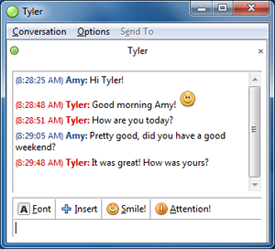Internet Safety
Introduction to Internet Safety
Internet safety and privacy
In the past, Internet safety generally referred to threats to computer hardware or identity theft, but now with the Internet becoming more and more social, privacy has become a significant safety concern. Privacy violations can especially affect our mental and physical well-being, thus creating distress or harm from the following:
- Undesired advertisements that can be annoying
- Embarrassing or humiliating photos or videos
- Legal entanglements from libelous posts
- Cyber-harassment or cyber-stalking
- Identity theft
- Offline or real-world crimes
Understanding the lingo
Click the buttons in the interactive below to learn about Internet safety terms that relate to privacy and social networking.

Flame War
A flame war is a heated argument in a social media outlet such as a web forum, mailing list or chat room, in which intentionally insulting comments and personal attacks become a focus of conversation.
Dooced
If someone loses their job because of something they posted on a blog or social networking site, they have been dooced.
Troll
A troll is a person who posts comments just to get a rise out of people and cause a distraction.
Trolls might say something rude, assert incorrect information, or ask questions unrelated to the topic at hand. People who respond to obvious trolling posts are said to be feeding the trolls, which often causes the trolls to return and continue disrupting the discussion.
Avatar
An avatar is a virtual representation of yourself. The term usually refers to a virtual image.
Instead of using your picture on a social networking profile, you might use an avatar to protect your privacy.
![]()
Sockpuppet
A sockpuppet is a fake identify that someone creates and uses to deceive others for some kind of personal gain. On most websites it is possible to have more than one account, so it is easy to create sockpuppets.
For example, John could have a few online identities for the same chat service: John45, Sarah03, and HarmonicasRock12. When he is HarmonicasRock12, he might pretend to be a 30-year-old music enthusiast to find out what music stores you go to. And when he is Sarah03, he might pretend to be a 20-year old college student to find out where you went to college.
Chats
Chats are live, online conversations. You can chat with people in a chat room or by using an instant messaging service.
Unlike having a conversation with someone out loud, everything you write in your chat session can easily be saved and shared with others. Think before you press send!

Posts
Content that people publish on websites involving social media, such as blogs, newsgroups, and forums are called posts. Twitter calls the posts that users make to Twitter sites tweets.
Posts are available to everyone who has access to the site. You do not always have the option to change or delete your post once it is posted. It is an instantly public representation of you or your online identify. Think before you post!
Meme
Meme is something that has gone viral, or spread rapidly around the internet, such as a catchphrase, hoax, topic, concept or piece of media.
Memes are often cute, funny or curious and make you want to pass them on! If you are forwarding an email, just remember that everyone who gets that email in the future could have access to your email address.
Screen Name
A screen name, sometimes called a user name, is a virtual name that is used to identify users of a website where social media is a component. Your screen name can be your real name or a pseudonym.
On sites where you regularly interact with strangers, it is a good idea to choose a pseudonym. When choosing a descriptive pseudonym such as tennis247 or partyboy18, keep in mind the image it might protray and the response it will solicit.
Flamebait
A comment posted by someone trying to provoke a flame, or an angry response, is called flamebait.
If anyone responds to the comment, they are said to have taken the bait.






